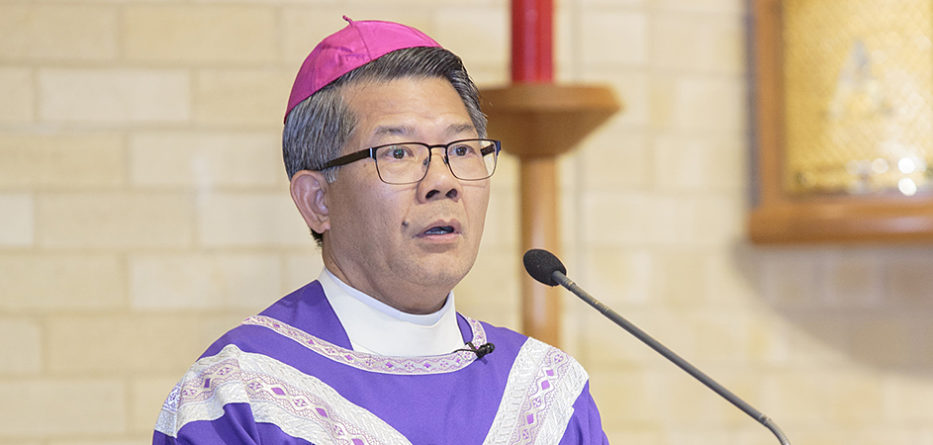Most Reverend Vincent Long Van Nguyen OFM Conv DD STL, Bishop of Parramatta
Homily for the Third Sunday of Lent, Year A at Sacred Heart Parish, Blackheath.
Readings: Exodus 17:3-7; Psalm 94(95):1-2, 6-9; Romans 5:1-2, 5-8; John 4:5-42
12 March 2023
Overcome our fears and live in God’s covenantal relationship.
Dear brothers and sisters,
We are often drawn towards strength, security and influence. Australia has recently signed the so-called AUKUS pact, which would strengthen our defence capability. Whether this deal contributes to a safer region and a safer world remains an open question. The Church too has not been spared of this propensity. This was particularly evident during the time of Christendom, when the Church controlled the levers of temporal power in much of the Western world. A dominant and triumphalist Christianity, as history has shown, can be distorted into prosperity, power, arrogance and even violence. The subjugation of the indigenous peoples in the name of the Gospel was the case in point.
On a personal level, we can easily turn to substitutes for God, especially when we are confronted with our limitations, fears and vulnerabilities. The problem we face may be loss, pain, loneliness, anxiety, poor self-image etc. We can easily be tempted to turn to solutions of a worldly nature, that is, those which are rooted in the security system the world has to offer, rather than the alternative system that God has to offer.
The Word of God on this Third Sunday in Lent focuses our attention on the importance of trusting in God and living by his counter-intuitive and counter-cultural way. Faith at its deepest level is not the way of tangible security, control and ability to tackle all problems. Rather, it is a journey of vulnerable trust, solidarity and covenantal fidelity. Thus, to follow this God is to walk the path of surrender, self-emptying and the cross of the humble suffering servant.
This is what the People of God were called to do as they made their pilgrim way to the Land of Promise. The exodus from Egypt had been an extraordinary experience of freedom and liberation. But the initial euphoria and excitement soon gave way to doubt and despair. Confronted with hunger and thirst, they vented their anger against Moses, “Why did you bring us out of Egypt… that we should die of thirst, our children and cattle, too?”
Fear and nostalgia won the day. The Israelites wanted to go back to slavery in Egypt and have their cravings satisfied rather than to persevere on the journey of transformation. They failed to pursue the higher calling which was to become the beacon of the new humanity, bonded not merely by the search for earthly securities but by truth, justice and life. The miracle of water from the rock was God’s response to Israel’s fearful anxiety. Like the miracle of manna, it was a theological statement that God could provide an abundant life-giving system outside Pharaoh’s monopoly. The test was not so much about food and drink as one’s allegiance and commitment. Israel was asked to live either with the imperial mindset of greed, accumulation, self-interest or God’s covenant of mutual love, mercy, justice, generosity and shared fraternity.
The story of the Samaritan woman at the well also reflects Israel’s journey of transformation. She was branded with social, moral and religious stigma. She was destined to a life of social isolation. Yet Jesus reaches out to her and enables her to grow from a consummate outsider to a witness for him. She begins the encounter as a curious inquirer and ends as a disciple of conviction. Her growth in faith is reflected in her appreciation of Jesus, first as a Jew, then a prophet, a Rabbi and finally as the Christ.
The story begins with her search for drinking water and finishes with her leaving behind her vessel, going into the city, and inviting others to their own encounter with Jesus, the vessel of living water. She moves from curiosity to clarity, doubt to faith, tribal mentality to bigger vision of truth, integrity, justice and love.
Dear friends,
Our faith, like that of the Samaritan woman, needs to grow beyond its present limitations to higher levels of interiority and maturity. She is no longer inhibited by her gender, ethnicity, culture and social status. Transformed by Jesus, she is emboldened to share her faith experience with others. She breaks through moral strictures and social conventions to become a witness for Jesus.
Lent is a time when we reflect on the bigger question of how our faith is lived. The Israelites teach us to interrogate our fidelity to God’s covenant and our propensity to the way of the world. Jesus, meanwhile, teaches us to move beyond buildings, rituals and traditions to the world of interiority, spiritual integrity and truth. May we learn to live deeper levels of faith, hope and trust. It is the kind of hope that comes from what Paul says the love of God that has filled our hearts. Let us commit ourselves to walk as pilgrims open to be formed and enriched by the Sprit. Then we shall learn to overcome our fears and live in God’s covenantal relationship.








